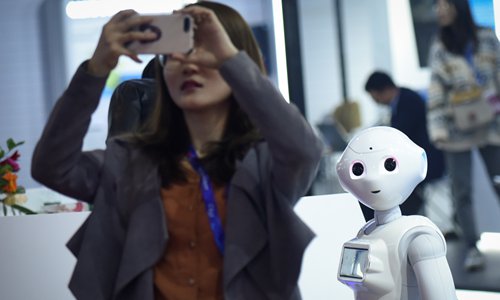AI and privacy concerns spark calls for tech industry to share wealth
From tagging photos on Facebook to driving with Google Maps, people should join forces in "data unions" to demand payment for letting online tools collect their data, according to an economist advocating for radical reforms to improve society.

A robot looks at a woman using her mobile phone at the China Beijing International High-Tech Expo on Thursday. The latest domestic technology achievements like applications of artificial intelligence, 5G and new-energy internet vehicles are being showcased. Photo: AFP
Glen Weyl, a principal researcher at the research arm of US tech giant Microsoft, said people have been "fooled" into handing over data that is then used in artificial intelligence (AI) to copy human behavior and possibly eliminate some jobs.
"Humans are doing all this work and then we are being told that we are doing nothing, that we play no role, and that these systems are just going to automate us away. This is profoundly dishonest," Weyl told the Thomson Reuters Foundation.
"We need to respect the fact that those data are actually being created by the very people who these companies are claiming are no longer relevant. And we need to acknowledge that by compensating them."
While getting paid for tagging photos on Instagram or uploading to YouTube might sound way off, the idea has been gaining some traction in the United States as tech giants from Google, to Facebook and Twitter, face increased scrutiny over the way they handle personal information.
Democratic presidential contender Andrew Yang has said people should receive a share of the economic value generated from their data, while the governor of California, Gavin Newsom, recently proposed companies should pay a "data dividend."
Weyl said the amount people would get is a matter of debate but it would in general depend on the size of the economy that becomes automated, with people getting more money the more jobs are taken over by artificial intelligence thanks to their data.
Estimates vary from $500 a year in a present day scenario, to $20,000 some 15 years down the line, when some projections say a third of all jobs will be done by computers, he said.
Yet, single users are unlikely to get a penny unless they organize in "data unions" similarly to what workers did during the industrial revolution, said Weyl, a speaker at the Thomson Reuters Foundation's annual Trust Conference on Thursday.
"People get paid for completing surveys, or putting television boxes in their home that monitor how they watch television," he said.
"The problem is that the ability of people to receive reasonable and fair compensation for what they do online is undermined by the fact that all these other people are consenting to do it for free."
Unions could bring together users with specific sets of data, like on travel or shopping habits, and bargain a better price for it, said Weyl, who co-authored the 2018 book "Radical Markets" with legal scholar Eric Posner.
They could also help address privacy concerns by restricting what information is collected and how it is used, he added.
Newspaper headline: Researcher proposes ‘data unions’